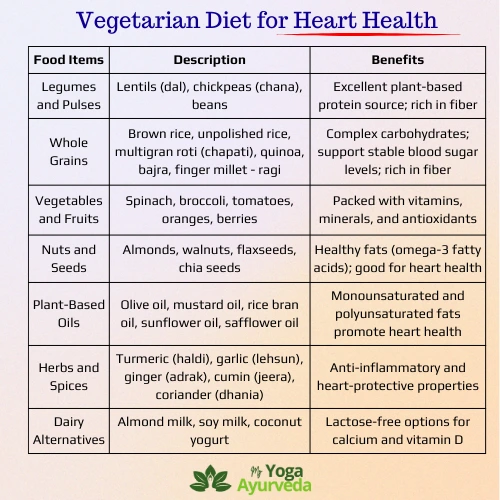
Written by Yoga Mentor Keshav, with facts sourced from Ancient Indian Ayurvedic and Yogic Textbooks, as well as scientific research.
Deep inside your chest, your hardworking heart keeps the blood traveling like a river through your body, delivering oxygen and nutrients to every corner.
There are many things you can do to keep your heart healthy, including eating a healthy diet, getting regular exercise, managing stress, and getting enough sleep.

Here are seven simple ways to keep your heart healthy, backed by science:
Adopting a heart-healthy diet involves incorporating fruits, vegetables, and whole grains into your meals while restricting the intake of saturated and unhealthy fats, cholesterol, and sodium. Evidence

Here are some specific tips:
Do at least 30 minutes of moderate-intensity exercise most days of the week.
Think brisk walking, swimming, or even a power yoga session – anything that gets you breathing a little harder but still lets you chat. It’s like giving your body a mini-vacation, and it comes with a ton of perks
Stress less, live more: Yoga’s blend of movement and mindfulness can melt away stress like sunshine on snow.
Yoga offers numerous health advantages, including stress reduction, enhancement of cardiovascular health, and support for weight loss and management. Evidence
Join Online Yoga Classes: Take a Free Trail
Yoga can be beneficial in the primary and secondary prevention of cardiovascular disease and that it can play a primary or a complementary role in this regard. Evidence
Here are some of the benefits of yoga for heart health:
Reduces stress: Stress is a major risk factor for heart disease. Yoga has been shown to be effective at reducing stress, which can lead to improved heart health.
Tai Chi and Yoga present alternative approaches for alleviating stress in individuals experiencing high levels of stress or negative emotions. Evidence
Improves blood pressure: Yoga can help to lower blood pressure by relaxing the blood vessels and improving circulation.
Lowers cholesterol levels: Yoga can help to lower cholesterol levels by improving fat metabolism and reducing inflammation.
Increases physical activity: Yoga is a form of physical activity that can help to improve cardiovascular health and reduce inflammation.
Improves sleep quality: Ever toss and turn at night, worried about your heart health? Turns out, a good night’s sleep could be just a downward dog away!
Research shows that yoga, with its blend of physical postures and calming breathwork, can be a powerful sleep-booster. It has been experienced by many yoga practitioners that Yoga has improved their sleep quality within few weeks of practice.
Promotes weight loss and maintenance: Obesity is a risk factor for heart disease. Yoga can help to promote weight loss and maintenance by increasing physical activity and reducing stress.
Regular health checkups are important for detecting and managing heart disease risk factors, such as high blood pressure, high cholesterol, and diabetes.
A simple health checkup normally consists of Complete hemogram, Renal profile, Lipid profile, Thyroid profile and blood sugar levels.
If you have any risk factors for heart disease, your doctor can work with you to develop a plan to reduce your risk.
Full Body Health Checkup @ Rs. 949/only
Sleep is essential for good health, and poor sleep quality can contribute to heart disease and other cardiovascular problems. Aim for 7-8 hours of sleep each night.
Struggle to sleep? Sleep problems like trouble breathing at night, sleepless nights, waking up often, and not getting enough rest can all take a toll on your body and your heart. Evidence
Smoking damages the heart and blood vessels, making it harder for blood to flow to the heart. This can lead to heart attack and stroke.
Smoking is a bad neighbour to your heart. It clogs up your blood vessels, making it harder for blood to flow and do its job.
This can lead to serious problems like heart attacks and strokes. Studies from around the world agree: smoking is a major cause of heart disease and death. Evidence
But the good news? You can turn back the clock! Quitting smoking helps your body repair the damage. Within one year, your risk of a heart attack drops in half. Win-win!
According to the National Family Health Survey-5 (NFHS-5), which was conducted in India in 2019-21, about one in four adults is overweight. This means that 23% of women and 22.1% of men in India are overweight.
Now, let’s talk about weight. In India, about one in four adults are overweight, meaning they carry a bit more than their bodies prefer. This extra weight can also increase your risk of heart disease. Evidence
Top 5 Yoga Poses for Weight Loss
Give your heart a high five! These simple tips can lower your risk of heart disease and keep your ticker happy. ♀️
Remember: This is just a friendly nudge, not a doctor’s advice. If you have concerns, listen to your heart and consult a pro! 🩺
Together, let’s keep our hearts healthy and strong! ❤️
What is the best diet for heart health?
A heart-healthy diet includes plenty of fruits, vegetables, and whole grains. while curbing the intake of saturated fats, unhealthy fats, cholesterol, and sodium.
How much exercise do I need to improve my heart health?
When it comes to boosting heart health through exercise, aim for a minimum of 15 minutes of stretching activity, 15 minutes of moderate-intensity activity, and 15 minutes of Breathing practices like Pranayama and Meditation on most days of the week.
What are some ways to manage stress?
There are many different ways to manage stress, such as exercise, yoga, meditation, and spending time with loved ones.
How much sleep do I need to improve my heart health?
7-8 hours of sleep each night is good for your heart health.
What are some ways to improve my social connections?
Spend time with loved ones, join a community or group, and volunteer in your community.
What are some ways to improve my emotional well-being?
Practice gratitude, spend time with loved ones, get involved in your community, take care of your physical health, and seek professional help if needed.
What are the symptoms of a heart attack?
The most common symptom of a heart attack is chest pain or discomfort. Other symptoms may include shortness of breath, nausea, vomiting, light headedness, and sweating.
If I think I’m having a heart attack, what should I do?
Consult your Doctor immediately.
Can I prevent heart disease?
Yes, there are many things you can do to prevent heart disease, such as eating a healthy diet, exercising regularly, managing stress, getting enough sleep, and controlling your cholesterol and blood pressure.
If I have risk factors for heart disease, what should I do?
Talk to your doctor about your risk factors and how to manage them.
What are the treatments for heart disease?
There are many different treatments for heart disease, depending on the type and severity of the disease. Treatments may include medication, surgery, and lifestyle changes.


